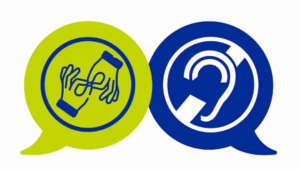Advocacy in interpreting is hotly contested. The role of the interpreter is unquestionably to be a language conduit, a clarifier, and a cultural broker. Being an advocate is much more difficult to pin down: what’s meant by advocate? And when is advocacy appropriate for an interpreter? Is an interpreter a mandatory reporter? In this installment of our Interpreter Skills series, we’ll discuss proper advocacy in interpreting.

Simplifying the Role of the Interpreter
In talking about it, let’s simplify the role of the interpreter even further. An excellent source for beginner interpreters is a book titled The Community Interpreter®: An International Textbook, by Sofía García-Beyaert, Marjory A. Bancroft, Katharine Allen, Giovanna Carriero-Contreras, Denis Socarrás-Estrada. The authors simplify the role of the interpreter to three words: Accuracy, Confidentiality, and Impartiality.
Advocacy is appropriate if it doesn’t violate the boundaries of any of those words. Phrased differently, keep in mind the three main tenants of interpreting they suggest. It’s important to interpret accurately. You must keep confidentiality. You must maintain professional distance. Remaining impartial requires that you don’t engage with the non-English speaker outside of the session. It’s also vital that you don’t “add your own piece” to the interpreting you do. Think very hard before you step into your role as advocate. Luckily, here’s an easy way to decide if advocacy is appropriate in a given situation. Ask yourself, “Is the patient’s health, well-being, or dignity at immediate and serious risk?”
Understand the Risks and Your Priorities as an Interpreter
The words “immediate and serious” are important here. It’s easy to think of a question you believe the non-English speaker should have asked. Maybe you’ve thought of information that the doctor should have said. You can imagine it impacting the patient down the line. It makes sense to feel that you should act to clear up any possible misunderstanding before it happens. We’re interpreters because we’re empathetic, because we want to help people. However, we’re professional interpreters because we’re able to distance ourselves. If the patient isn’t at immediate, right-now-serious risk, we do not advocate. This is the difference between an interpreter and a bilingual speaker.
Another excellent resource is Paula Tessier’s 2004 work, “The advocacy controversy in medical interpreting: different views on the professional role of interpreters.” In this text, she makes the following, excellent point: interpreting in itself is a form of advocacy. Making cultural and linguistic clarifications appropriately, in context, is a form of advocacy. Even if you feel that you’re “not doing enough,” you must never act with haste. If the non-English speaker’s health, well-being, or dignity aren’t immediately and seriously at risk, hold back. The proper choice is to stay in the bounds of your role as an interpreter and not advocate on their behalf.
How to Advocate
There are, occasionally, times when it is appropriate to act as an advocate. Let’s talk about some steps you can take to ensure that you’re advocating only when it’s acceptable to do so.
- Consciously identify the causes that are making you feel that you should step into the role of the advocate.
- Ask yourself: if you don’t advocate, is the patient’s safety, health, well-being, or dignity at SERIOUS risk? if no, then it’s not appropriate to advocate.
- If yes. Ask yourself: “is the serious risk against the non-English speaker’s safety, health, or dignity IMMINENT?
- If the risk isn’t imminent, find the right channels to report the situation. This could be the client themself (for example, if it’s themself who’s putting you in the dilemma), or your agency after the assignment. If you’re working as a freelancer with the client, ask the front desk to speak with a supervisor. An example of this would be if the provider made derogatory comments towards the patient. Naturally, you interpreted them, because you’re duty-bound to do so even though it’s highly uncomfortable. The patient was too timid to speak up. You’re worried that the doctor will act that way towards other patients as well. In this case, the patient’s dignity is in risk, but the patient isn’t in imminent danger. The best way to handle this would be to report the incident to your agency. This way, we can appropriately follow up and submit the claim through the proper channels. As we’re the client’s contracted entity, our role is to report the incident to them. As you’re our contracted entity, your role is to report the incident to us.
- If the risk IS imminent and the patient is in danger, consider taking immediate action in full awareness of the consequences.
Example of a scenario when advocacy is appropriate.
Imagine that a nurse is about to administer a drug containing iodine to a patient with whom you’ve worked before. You know the patient is allergic to iodine. What do you do? A first step is to step out of your role as interpreter and into your role as clarifier. Perhaps say, “Excuse me, the interpreter would like to clarify that the patient understands that the medication contains iodine.” This might be enough for the patient to say “don’t administer this drug–I’m allergic to iodine!” If that doesn’t work, you could step out of role again. This time, you might suggest that the nurse ask about allergies to iodine. If at all possible, you want the patient to disclose the information. If all else fails, it’s appropriate to consider disclosing the allergy to prevent harm.
Note that advocacy should be engaged in only after trying other options. The Cross-Cultural Communications Center describes it concisely in their guide to proper interpreter advocacy. “Advocacy must only be undertaken after careful and thoughtful analysis of the situation and if other less intrusive actions have not resolved the problem.” Always work your way up from the least intrusive possible to the most—and only when necessary.
Global Arena’s Interpreter Training Program
Looking for a place to discuss interpreting topics with peers while building a foundation for your career? Global Arena’s interpreting program covers the four main types of interpreting assignments: medical, school, business, and legal. Our goal is to create a base for new interpreters just starting in the industry. Experienced interpreters also benefit from brushing up on their skills and industry knowledge. The course is discussion and activity-based to keep it dynamic and engaging. The training takes place over zoom, on four consecutive days. It’s at the same time each day: from 8:30 am- 12:30 PM EST. Participants receive a welcome packet with reference materials, including activity pages and glossaries. You’ll also receive a certificate of completion upon passing exam score: useful for interpreting applications and resume-building. Sign up or learn more about the Global Arena’s Interpreter Training Program.




